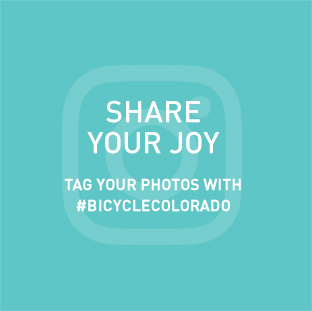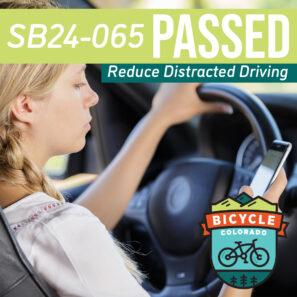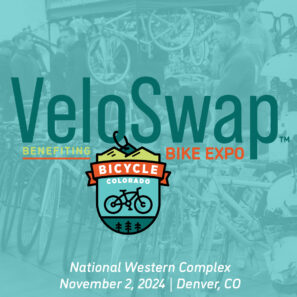Riding the Great Divide: An interview with Brooke Goudy
Brooke Goudy is a Co-Leader with the Denver chapter of Black Girls Do Bike, which champions “growing and supporting a community of women of color who share a passion for cycling.” She recently completed the Great Divide Mountain Bike Route with her partner. We spoke with her about what biking means to her, her experiences on the trip and Black representation in sports.
Hero image credit: Dan Furlani
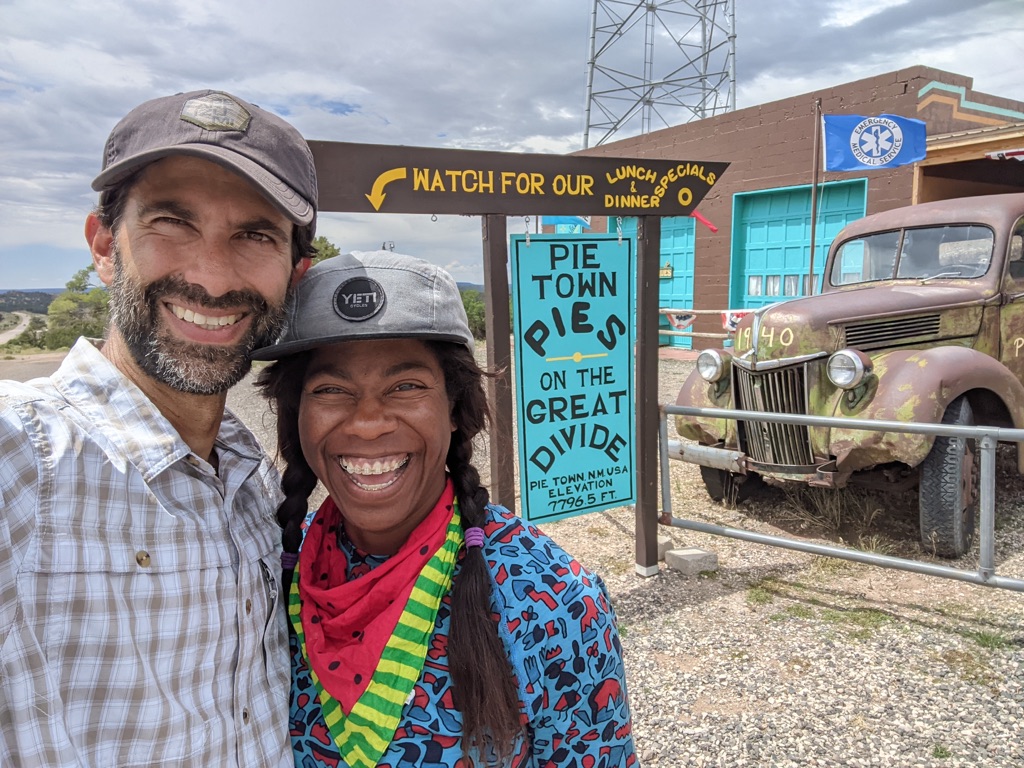
Brooke Goudy did a multi-night bikepacking trip for the first time this year and, instead of dipping her toes in the water she dove in to the deepest end she could imagine. Over the course of 60 days, Brooke rode the length of the Great Divide Mountain Bike Route, which took her through Montana, Wyoming, Colorado and New Mexico.
“It was the hardest thing I’ve ever chosen to do,” she said. “I absolutely loved it.”
She and her partner rode unsupported apart from a brief stay with her partner’s sister while they were passing near Silverthorne, Colorado. As exhausting and grueling as it was, it was also beautiful, and Brooke is proud of her strength and endurance. “I think before the Great Divide, I was living in a world where I wanted people to say, ‘I’m proud of you, Brooke,’” she told us. “Post-Great Divide, I’m living in a world where every day I’m like, ‘I’m so proud of myself.’ And I’m not afraid to say it to other people, too.”
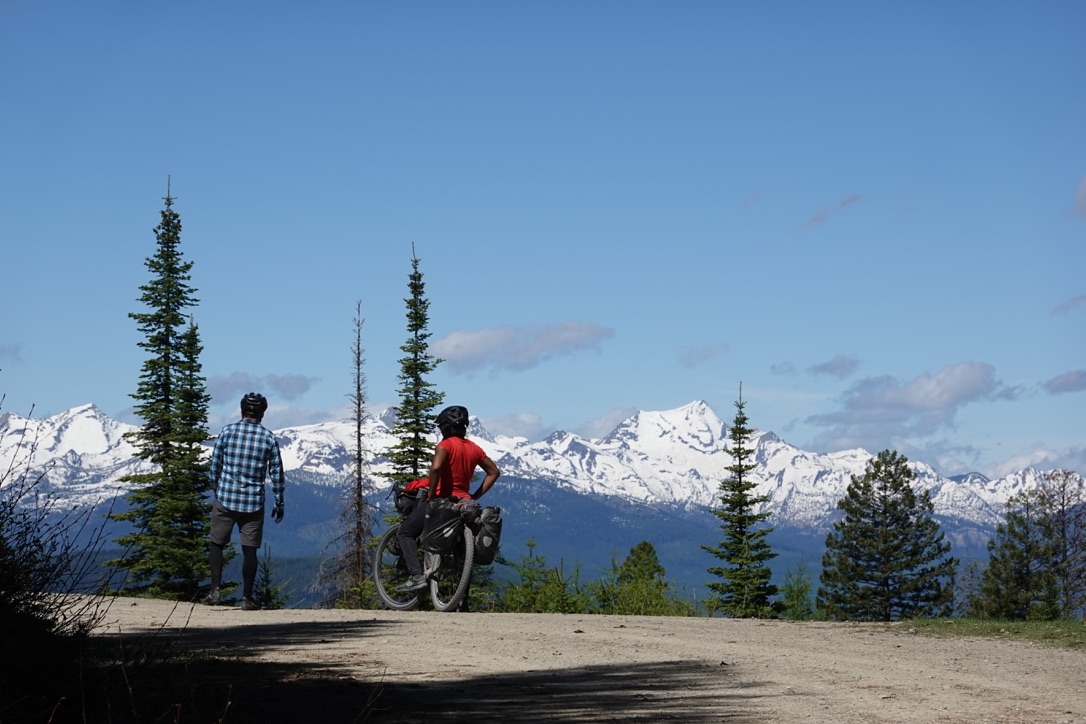
Photo credit: Dan Furlani
Brooke shed countless tears throughout her journey—of relief and of joy, but also of frustration and hurt. Much of that stemmed from the difficulties of being a Black woman riding the Great Divide Mountain Biking Route.
“I passed through a lot of towns where people were uncomfortable with my presence and downright wanted me to know that they were not comfortable with me being there. There was a time where everyone at the table got served, except for me. There were times where I went into places and the little town had signs that let me know that I wasn’t welcome there,” Brooke shared with us.
Her experience highlighted for her once again the importance of demonstrating that Black women can accomplish hard things, including challenging trails and bikepacking. “I think for so many reasons, it was important for me to be out there because I’m Black. And that matters because I don’t look like your typical athlete. I don’t have the body type of your typical athlete, of your typical cyclist. I think that matters. For them to be able to see themselves on that trail,” she said. “And I think that’s inspiring.”
For Brooke, bicycling, and organizations like Black Girls Do Bike Denver, which she co-leads, are ways to help Black women and girls tap into the joys of an activity like biking and to be a part of breaking down barriers for Black people and other people of color in the United States. Often bike advocates and bike advocacy organizations—including Bicycle Colorado over the years—are focused on getting people on bikes as an end goal, but Brooke thinks of biking as just one way to connect people and make people aware of injustices and barriers to access inside and outside of bicycling.
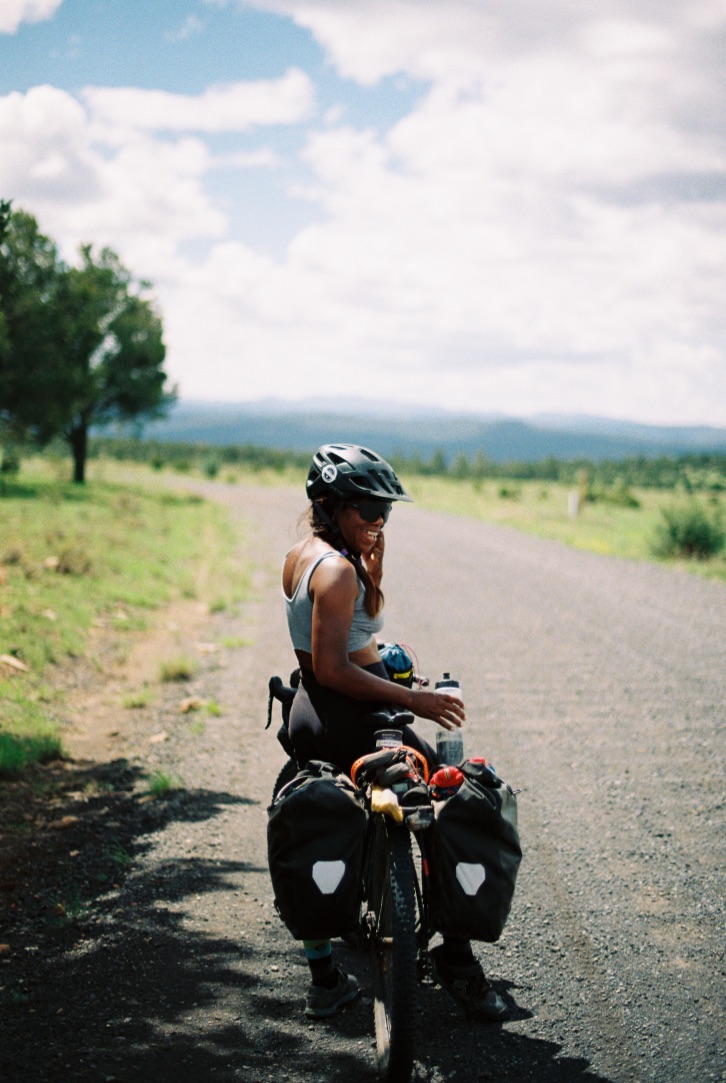
Photo credit: Evan Green
“It could have been running, it could have been skiing, [for me] it happened to be biking. And it was just an incredible lens or avenue to really becoming an advocate for Black folks and women. This work isn’t about just breaking down barriers so that people can get on a bike—I mean, that’s what we say—but the idea is to introduce to white folks the barriers that have existed for a long time, to have deeper conversations about race and systemic racism, and what that looks like or what it means. And if we can show that a little in the biking world, it can unveil people’s eyes to what is happening across the United States,” Brooke said.
In addition to the Great Divide Trail, Brooke also rode SBT GRVL (pronounced Steamboat Gravel) this year as part of a team recruited through Ride for Racial Justice. She and everyone riding in their group were all people of color; she says she felt comfortable being around other riders who could more closely empathize with her experiences as a Black female bicyclist. SBT GRVL was her first bike race, and she was thrilled to be a part of the event.
“I am out here trying to break barriers for other people, so that they can get on bikes. But to have an organization advocate for me and introduce me to something new, something that you don’t see a lot of Black folks doing, was amazing. And guess what? I freaking loved it,” she shared.
We asked her what she would ask of bicyclists and bike advocates who have historically considered safety on a bike a question of safety from automobiles, and who have considered access to bicycling an issue of simply giving people bikes or teaching them how to ride. She says she appreciates people sharing stories about Black people on social media, about Black joy and Black trauma, but that it’s not enough.
“The brave things are doing the things that really make you uncomfortable, or really hurt,” she said. “Get uncomfortable, because every day I’m bearing a load, and I am doing the uncomfortable things for something that is not even something that I created. White folks have so much power, if they would just be willing to get into those uncomfortable spaces. And I will say, I rarely see white folks in uncomfortable spaces.”
She continued, “I want people to know that I think this is a moral and ethical issue. Not like, ‘I don’t want my organization getting political’ or whatever. These are moral issues.”
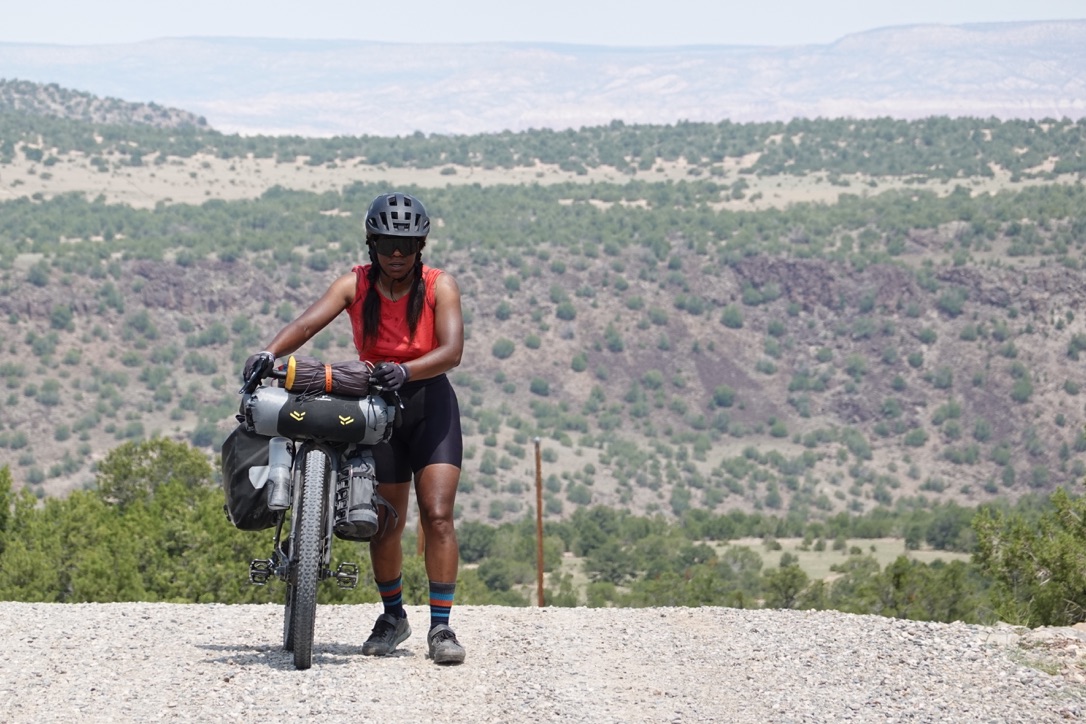
Photo credit: Dan Furlani
We weren’t able to find demographic or ridership data for the Great Divide Mountain Bike Route at Bicycle Colorado, but Brooke’s experience as a Black woman riding the route was surely unique. Even having advocated to get more Black women riding bikes, and even knowing that Black women are underrepresented in bicycling and bicycling media, Brooke wasn’t prepared for some of the hateful—and racist—experiences she had while on the ride. But what Brooke could prepare for, she did, and she has three pieces of advice for people who are considering this ride or any ride that will push someone to the limits of their bicycling ability. First, she says, imagine yourself finishing. Envision what that moment will look like, and remember that goal. She also advises that riders need to have a “why.”
“I journal my ‘why’ over and over again, I wrote articles about my ‘why,’ I thought about my ‘why.’ My ‘why’ was to have this spiritual journey,” she said.
Brooke also observed during our conversation that mountain biking has a unique vocabulary—that the way one interacts with the land is by “shredding” or “defeating” a hill, for example. She made a conscious effort during her bikepacking trip to ask herself questions about connection as opposed to domination: “How am I connecting with the ground? How am I connecting with the rocks? How am I connecting with the view that I’m seeing? How am I connecting with the beautiful sun that’s shining on me?”
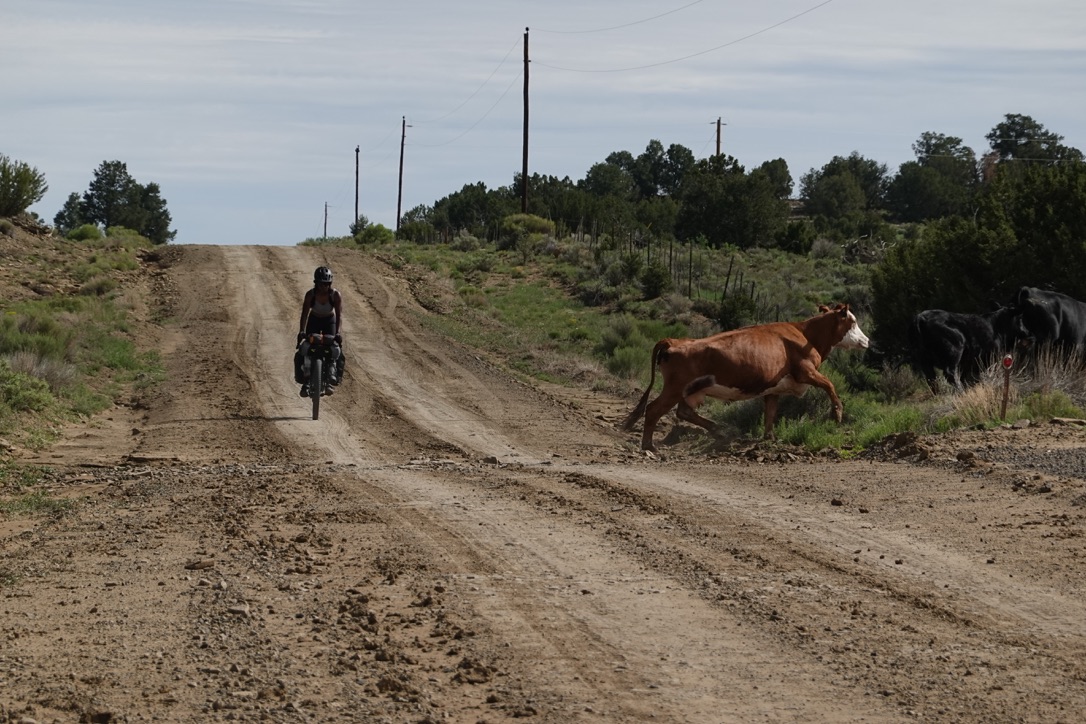
Photo credit: Dan Furlani
She recommends, too, that one must have a mantra. While riding the Great Divide, she kept telling herself, “I can do hard things.” As she pedaled and pushed herself to her limits, she let herself embrace and understand the internal voices that discouraged her or suggested to herself that she wasn’t cut out for this. “It’s your body trying to protect you, it’s my Blackness trying to protect me, but then in the remoteness of it all you have to realize those are just parts, because there’s other parts that [say], ‘You are strong, look at what you just did.’ There are parts that are like, ‘You are fierce, you keep rocking it.’”
When we asked about her gear setup on the trip, Brooke laughed and implied that, all things considered, the gear selection was a small part of the trip compared to the rest of her experience. “I mean, I like having that much room,” she said. “I think I could reduce some weight, [but] I really loved my setup because it was relaxing. And I could fit beer and wine in there.”
Brooke is excited to share that she plans to not only ride the Great Divide Mountain Bike Route again after getting a taste of it this year, but to race it. She’s looking forward to racing more in general, and to tapping into her newfound passion for getting more women, and Black women especially, into bikepacking. We’re excited to see what’s next!
Bicycle Colorado members help make it possible for us to tell stories like Brooke’s.
Join Bicycle Colorado today and become a part of the movement to make biking better and more equitable for everyone in Colorado.
Leave A COMMENT
Our twitter feed is unavailable right now.





